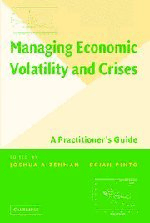Table Of ContentP1:JtR
0521855241pre CB932-Aizenman 0521855241 August30,2005 20:48
This page intentionally left blank
ii
P1:JtR
0521855241pre CB932-Aizenman 0521855241 August30,2005 20:48
MANAGINGECONOMICVOLATILITYANDCRISES
APractitioner’sGuide
Overthepasttenyears,economicvolatilityhascomeintoitsownafterbeingtreated
fordecadesasasecondaryphenomenoninthebusinesscycleliterature.Thisevolution
has been driven by the recognition that nonlinearities, long buried by the economist’s
penchantforlinearity,magnifythenegativeeffectsofvolatilityonlong-rungrowthand
inequality,especiallyinpoorcountries.Goodtimesdonotoffsetthenegativeimpactof
badtimes,whichleadstopermanentnegativeeffectsthatarereinforcedbyincomplete
markets,sovereignrisk,divisivepolitics,inefficienttaxation,procyclicalfiscalpolicy,
andweakfinancialmarketinstitutions.Thesamephenomenathatmakevolatilitydifficult
tocopewithalsodriveeconomiccrises.Thisbookorganizesempiricalandpolicyresults
for economists and development policy practitioners into four parts: basic features,
includingtheimpactofvolatilityongrowthandpoverty;commoditypricevolatility;the
financialsector’sdualroleasanabsorberandamplifierofshocks;andthemanagement
and prevention of macroeconomic crises. The latter section includes a cross-country
study,casestudiesonArgentinaandRussia,andlessonsfromthedebtdefaultepisodes
ofthe1980sand1990s.
Joshua Aizenman is Professor of Economics at the University of California, Santa
Cruz.PriortohisappointmentatUCSC,hewasChampionProfessorofInternational
EconomicsatDartmouthCollege.ProfessorAizenman’sotheraffiliationshaveincluded
teaching and research positions at the University of Pennsylvania, the University of
Chicago Graduate School of Business, and the Hebrew University in Jerusalem. He
has held consultancies with the International Monetary Fund, the World Bank, the
Inter-American Development Bank, and the Federal Reserve Bank of San Francisco.
His research covers a range of issues in open economy including commercial and
financial policies, crises in emerging markets, foreign direct investment, capital con-
trols, and exchange rate regimes. Professor Aizenman also serves as a Research
AssociatefortheNationalBureauofEconomicResearch.
BrianPintohasbeenattheWorldBank,Washington,DC,formorethan20years.He
iscurrentlyEconomicAdviserintheEconomicPolicyandDebtDepartment,Poverty
Reduction and Economic Management Anchor. Past assignments in the World Bank
Groupincludestintsinborrowingoperations,theInternationalFinanceCorporation,and
theEuropeandCentralAsiaRegion.Dr.PintolivedandworkedinPolandatthestartofits
momentousreforms(1990–92)andsubsequentlyinRussiaduringaperiodwhichcovered
its 1998 crisis and subsequent recovery (1998–2001). His areas of expertise include
policy-orientedanalysesofmacroeconomiccrisesandrecovery,publicdebtdynamics,
and transition economics. His publications have appeared in numerous professional
journals.
i
P1:JtR
0521855241pre CB932-Aizenman 0521855241 August30,2005 20:48
ii
P1:JtR
0521855241pre CB932-Aizenman 0521855241 August30,2005 20:48
MANAGING ECONOMIC
VOLATILITY AND CRISES
A Practitioner’s Guide
Editedby
JOSHUA AIZENMAN
UniversityofCalifornia,SantaCruz
BRIAN PINTO
TheWorldBank
iii
cambridge university press
Cambridge, New York, Melbourne, Madrid, Cape Town, Singapore, São Paulo
Cambridge University Press
The Edinburgh Building, Cambridge cb2 2ru,UK
Published in the United States of America by Cambridge University Press, New York
www.cambridge.org
Informationonthistitle:www.cambrid ge.org/9780521855242
©TheWorldBank2005
This publication is in copyright. Subject to statutory exception and to the provision of
relevant collective licensing agreements, no reproduction of any part may take place
without the written permission of Cambridge University Press.
First published in print format 2005
isbn-13 978-0-511-14003-7 eBook (EBL)
isbn-10 0-511-14003-7
eBook (EBL)
isbn-13 978-0-521-85524-2 hardback
isbn-10 0-521-85524-1 hardback
Cambridge University Press has no responsibility for the persistence or accuracy of urls
for external or third-party internet websites referred to in this publication, and does not
guaranteethatanycontentonsuchwebsitesis,orwillremain,accurateorappropriate.
P1:JtR
0521855241pre CB932-Aizenman 0521855241 August30,2005 20:48
ToMichalandourdaughters,AviandAnbar
Tomymother,Praxedes,andthememoryofmyfather,HughPinto
v
P1:JtR
0521855241pre CB932-Aizenman 0521855241 August30,2005 20:48
vi
P1:JtR
0521855241pre CB932-Aizenman 0521855241 August30,2005 20:48
Contents
Contributors page ix
Acknowledgments xi
Foreword xiii
Overview 1
JoshuaAizenmanandBrianPinto
PARTI. WHATISVOLATILITYANDWHYDOESITMATTER?
1. Volatility:DefinitionsandConsequences 45
HolgerWolf
2. VolatilityandGrowth 65
ViktoriaHnatkovskaandNormanLoayza
3. Volatility,IncomeDistribution,andPoverty 101
ThomasLaursenandSandeepMahajan
PARTII. COMMODITYPRICESANDVOLATILITY
4. AgriculturalCommodityPriceVolatility 137
JanDehn,ChristopherGilbert,andPanosVarangis
5. ManagingOilBoomsandBustsinDevelopingCountries 186
JuliaDevlinandMichaelLewin
PARTIII. FINANCEANDVOLATILITY
6. FinanceandVolatility 213
StijnClaessens
7. EvaluatingPricingSignalsfromtheBondMarkets 281
JohnJ.Merrick,Jr.
PARTIV. MANAGINGCRISES
8. ManagingMacroeconomicCrises:PolicyLessons 315
JeffreyFrankelandShang-JinWei
vii
P1:JtR
0521855241pre CB932-Aizenman 0521855241 August30,2005 20:48
viii Contents
9. LessonsfromtheRussianCrisisof1998andRecovery 406
BrianPinto,EvseyGurvich,andSergeiUlatov
10. Argentina’sMacroeconomicCollapse:CausesandLessons 439
LuisServe´nandGuillermoPerry
11. DefaultEpisodesinthe1980sand1990s:WhatHaveWeLearned? 471
PunamChuhanandFedericoSturzenegger
TechnicalAppendix 521
ViktoriaHnatkovska
Index 567

